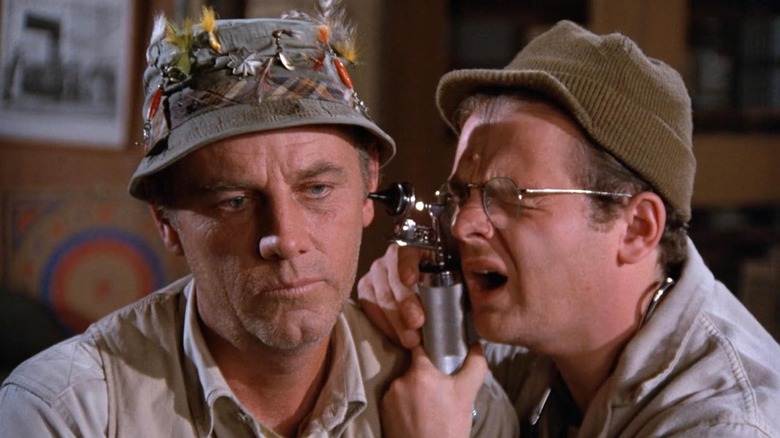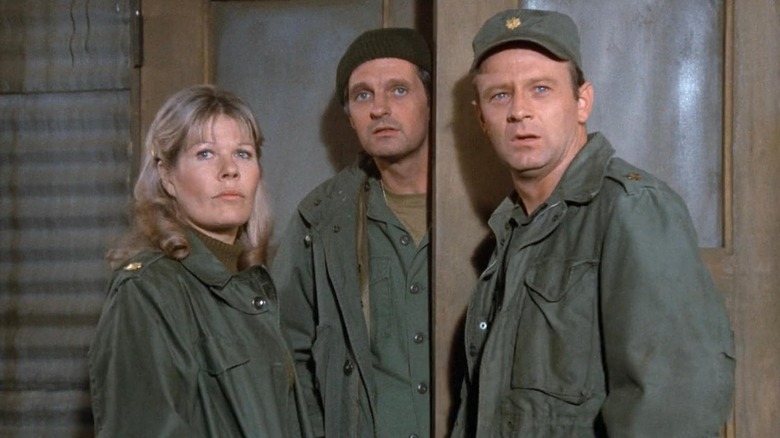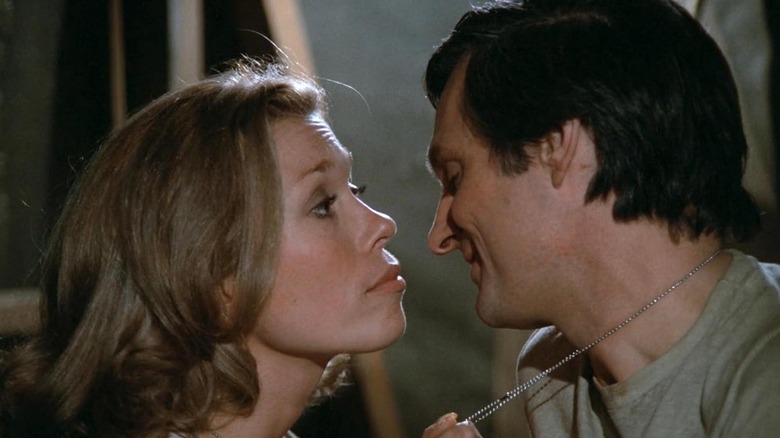One Of The Most Important And Beloved Sitcoms Of All Time Was Nearly Canceled After One Season
CBS' sitcom "M*A*S*H" went on for 11 seasons, and by the end of its run, it was a ratings juggernaut. The "M*A*S*H" series finale was watched live by 125 million viewers, a record no other sitcom has beaten and — given the sad state of network TV viewership numbers — a record no sitcom will likely ever beat again. But while the show's success may seem like a given today, at the time it was unclear if CBS would even keep it going beyond its first season.
The "M*A*S*H" pilot was ranked 45th in its time slot, and in subsequent weeks, the show only ranked lower. The series' ratings nadir came on December 10, 1972 with "Germ Warfare," which ranked 56th in its time slot. If it had continued on this trajectory, the show would've been canned and few people today would even remember it existed. Instead the trend reversed, and it even reached the top 20 by season 1's penultimate episode. This still wasn't that promising, though, which is why Alan Alda (who played Hawkeye) remarked how lucky he felt that "M*A*S*H" was allowed to continue in the show's 2002 reunion special.
"They kept it on the air, even though we were at the bottom of the ratings," Alda marveled. His co-star William Christopher (who played Father Francis Mulcahy) similarly recalled, "It was the end of the first year when we were having our party, and [my wife] Barbara and I were leaving early, we had a concert or something, and we said goodbye to you, Alan, and you said, 'We may not see each other again.'"
M*A*S*H survived thanks to a combination of luck and talent
In its season 2 premiere, "M*A*S*H" ranked third in its time slot, and it never ranked below 15th place for the rest of the season. What changed? It was partially that people had caught up on the show during the summer reruns, but perhaps most crucial was that CBS moved its time slot. In season 1, "M*A*S*H" aired on Sundays at 8pm, competing with several heavy-hitters of the time. In season 2, "M*A*S*H" was moved to the Saturday 8:30pm slot, airing between the popular sitcoms "All in the Family" and "The Mary Tyler Moore Show." It was similar to how the early seasons of "Friends" benefitted from airing right after "Seinfeld."
The other element that helped "M*A*S*H" was that the higher-ups at CBS seemed to enjoy the series and wanted to see it succeed. As Gary Burghoff (who played Radar) explained, "The way I got it was that Mrs. William Paley — whose husband ran, owned CBS — loved our show, despite our bad time slot. [...] And it was a series of pillow talks where she just said, 'You can't let that show go, you can't let that show go.' That may or may not be true."
Wayne Rogers (who played Trapper John in the first three seasons of "M*A*S*H") added that CBS' decision to keep the show was commendable regardless of the actual reason. "Well, the fact is, [CBS executive] Fred Silverman didn't just dump it. I mean, in this day and age, you know, six shows and you're gone, goodbye," he noted. The problem he's describing, i.e. networks becoming increasingly unlikely to allow a series to survive past its low-rated first season, has only gotten worse in the age of Netflix and streaming.
Critics urged CBS to keep 'M*A*S*H' around
It wasn't just the CBS heads who liked "M*A*S*H;" critics did as well. Critic Ernie Kreiling wrote after the premiere, "'M*A*S*H' is pretty strong stuff. It is raw sex, ribald humor, and utter sacrilege. I suspect CBS will come in for torrents of criticism from some parts of the country and from segments of the great audience for bringing R rated entertainment into the home at 8pm. But I say, huuuraay for CBS."
The running theme in the show's reviews was that CBS shouldn't let the viewership numbers deter it from keeping "M*A*S*H" going and really needed to change the series' time slot. As critic Charles Witbeck put it:
"According to the early rating figures, the public has yet to discover the funniest new comedy show of the season. [...] Blame that oversight on the time slot — Sunday nights at 8 opposite Disney and 'The F.B.I.' — hardly an ideal choice for the inspired antics of two Army surgeons stationed at a Mobile Army Surgical Hospital during the Korean War."
Cecil Smith at the Los Angeles Times hammered the point home further, wondering "what network nitwit" picked such a bad time slot and declaring that the choice "will quite likely kill" the promising series.
In an article published by the Connecticut Post at the time, Alda noted that the early reviews were "better than I expected," adding, "We know we have a good show, but critics don't [usually] stick their necks out and go overboard like this." It goes to show that sometimes it doesn't matter what terrible time slot a series is aired at; if it's good enough, the viewers will come. There's a chance that even if CBS had kept the series in that original time slot, "M*A*S*H" could've grown its audience through positive word of mouth alone.


